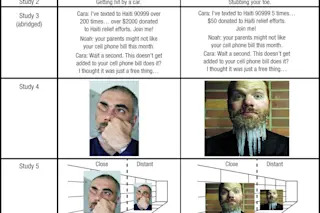Too Close for Comfort, or Too Far to Care? Finding Humor in Distant Tragedies and Close Mishaps"Humor is ubiquitous and often beneficial, but the conditions that elicit it have been debated for millennia. We examine two factors that jointly influence perceptions of humor: the degree to which a stimulus is a violation (tragedy vs. mishap) and one’s perceived distance from the stimulus (far vs. close). Five studies show that tragedies (which feature severe violations) are more humorous when temporally, socially, hypothetically, or spatially distant, but that mishaps (which feature mild violations) are more humorous when psychologically close. Although prevailing theories of humor have difficulty explaining the interaction between severity and distance revealed in these studies, our results are consistent with the proposal that humor occurs when a violation simultaneously seems benign. This benign-violation account suggests that distance facilitates humor in the case of tragedies by reducing threat, but that closeness ...
NCBI ROFL: And the award for craziest scientific figure goes to...
Explore how humor in distant tragedies hinges on perceived violations and distance, revealing unique comedic dynamics.
More on Discover
Stay Curious
SubscribeTo The Magazine
Save up to 40% off the cover price when you subscribe to Discover magazine.
Subscribe













